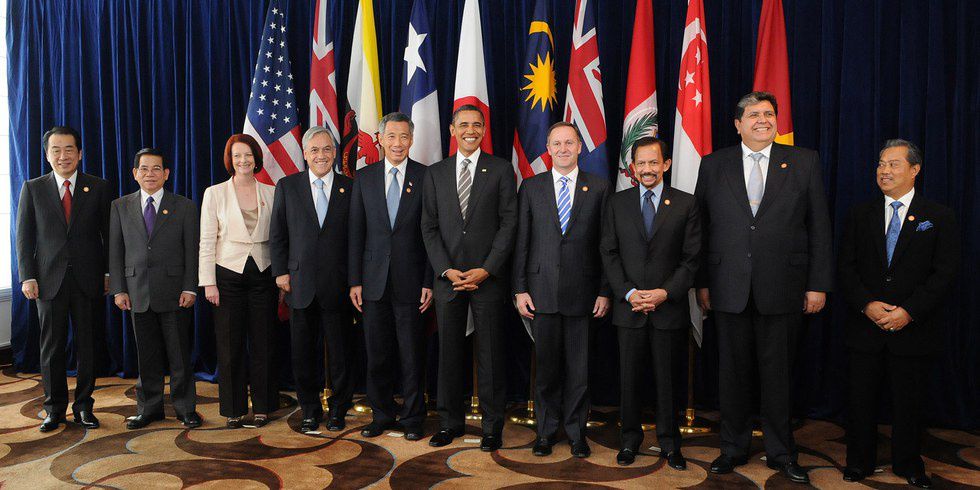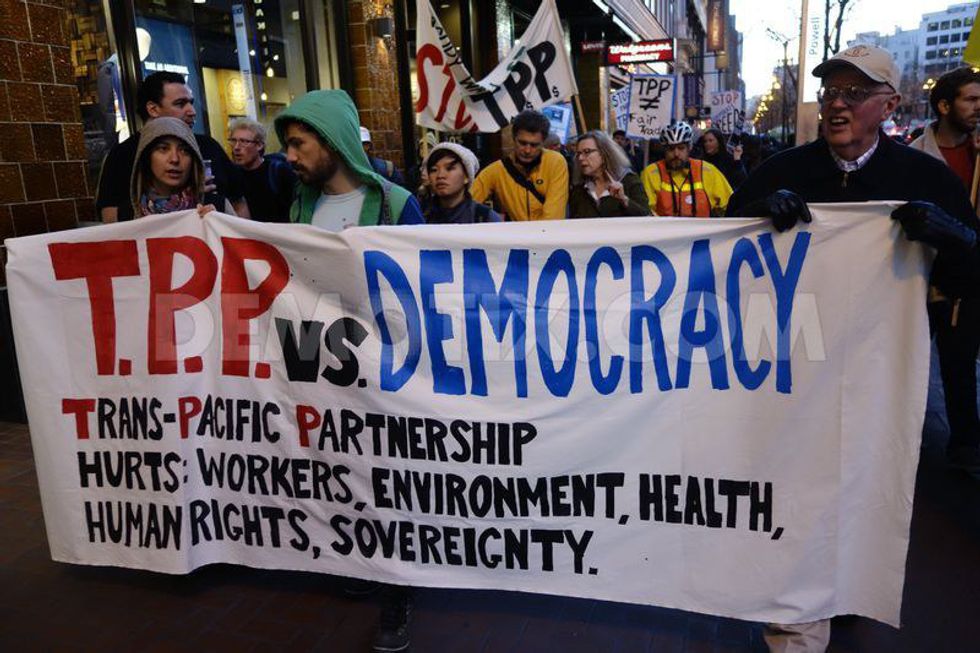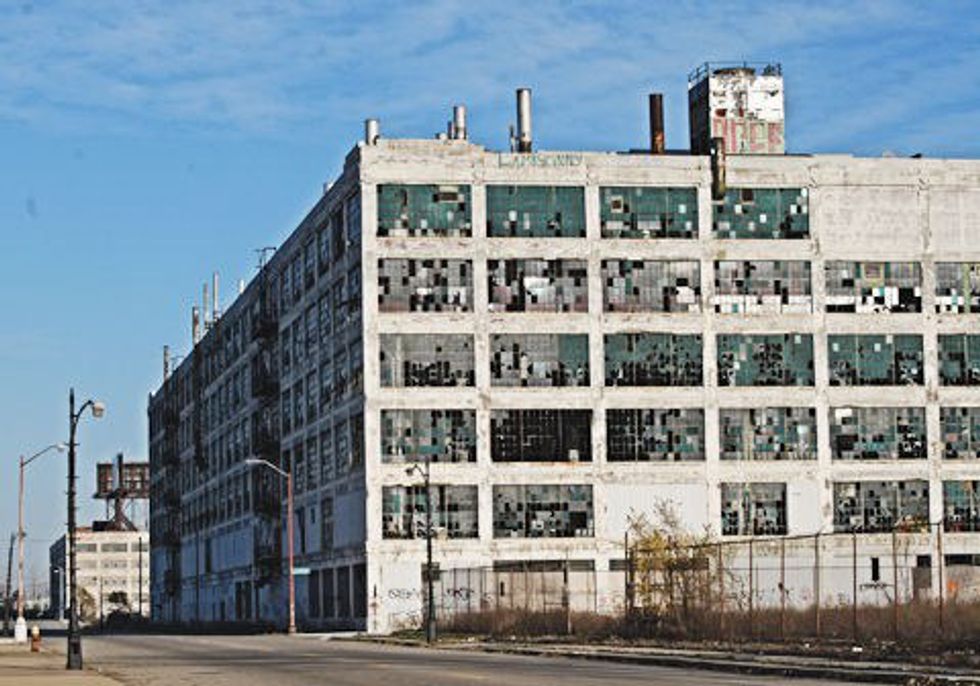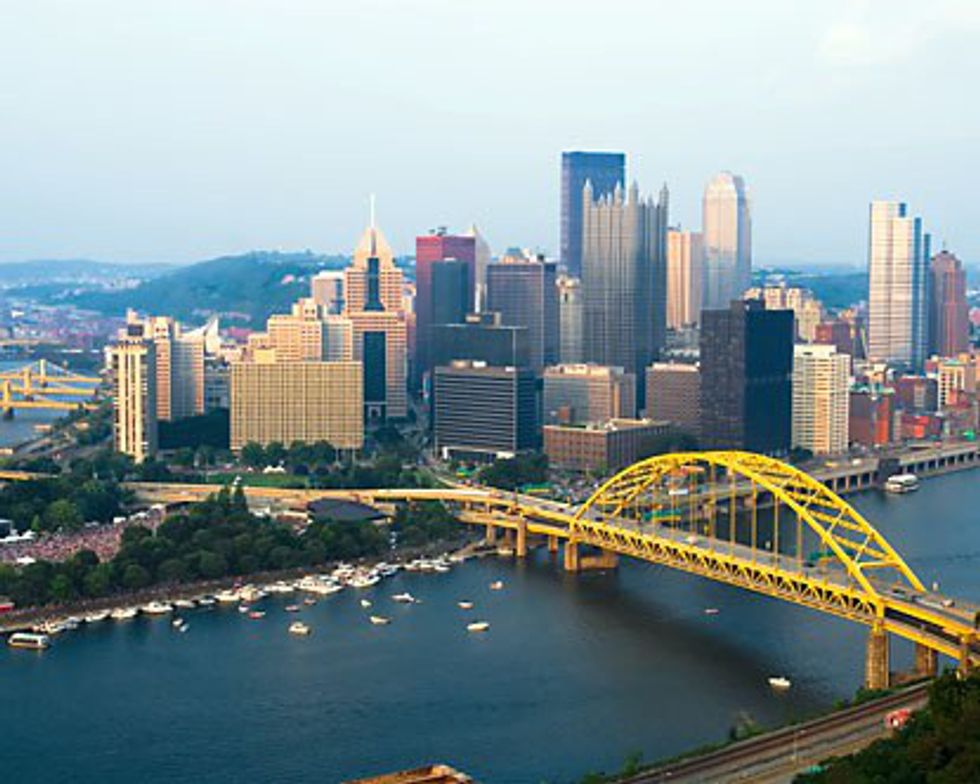Months before it became a controversial topic discussed at presidential debates and on cable news panels, I stated my opposition to the Trans-Pacific Partnership. I stood with progressive politicians and intellectuals across the country who aimed to prevent its implementation. From my position as a teenager in high school, I couldn't do much. I'd retweet information on the deal and consistently tweeted #STOPTPP. As President Trump withdrew us from the Trans Pacific Partnership, I had a change of heart on the deal. There were still undeniable problems with TPP, but we went about attacking it all wrong. Instead of #STOPTPP, it should have been #FIXTPP. Republicans attacked the Affordable Care Act, but had no plan ready to replace it. Progressives should have been focused on fixing the Trans-Pacific Partnership as opposed to all out deleting the deal.
Now, President Trump has done what we wanted and withdrew us from TPP, but at what cost? Our trade policies undoubtedly need to be fixed so that they benefit all parties involved. I now believe that trade deals need to be fixed instead of removed altogether.
The Trans-Pacific Partnership was meant to include Australia, Brunei, Canada, Chile, Japan, Malaysia, Mexico, New Zealand, Peru, Singapore, United States, and Vietnam. It encompassed 40% of the world’s economy. As with all free trade deals, it would lift tariffs and quotas among member nations. Those who supported the deal saw it as a way to check China’s expanding dominance in the world economy and as a way to improve the respective economies of all countries involved. Detractors to the deal saw TPP as a pro-corporate deal that would ship jobs overseas, with few human rights provisions, with aspects of the deal still not being made available to the public. I was consistently in the latter group. Economists disagreed as to whether or not jobs would be lost and provisions relating to human rights protection would be difficult to enforce. With President Trump killing TPP, I now realize that Democrats should have worked to fix TPP instead of advocating for getting rid of it all together.
The Human Rights Watch, which opposed the Trans-Pacific Partnership, laid out changes needed to be made in order for them to endorse the deal. The further stated that the agreement should go into force, but then make benefits of the TPP should be contingent on the other countries demonstrating their implementation of the required reforms. Benefits would be phased in based on the progress of reforms. A major criticism of the TPP was that corporations would be able to sue governments for passing regulations that could harm their future profits. Similar to this pro-corporate provision of the deal, the Human Rights Watch wanted a dispute resolution system where trade unions, labor federations, and advocacy groups could push for improvements on issues affecting workers. These groups could go to the governments of TPP member countries and lobby to include policies and programs that were more worker friendly, similar to the process availed to corporations under TPP. The Human Rights Watch also wanted to see more effective provisions for filing complaints on behalf of workers.
The AFL-CIO was another major organization that opposed TPP. The largest federation of unions in the U.S. took aim at the provision that would require the United States to treat TPP member countries’ products the same as American products. This would have negatively affected “Buy American” rules that have been the law of the land for years. The AFL-CIO also worried about monopoly under the deal. The TPP included rights of monopoly for pharmaceutical companies that would delay the competition of affordable generic drugs entering the market.
There were undeniable problems with the Trans Pacific Partnership. In hindsight though, Democrats should have been focused on improving the deal rather than writing it off altogether. Trump’s decision to pull out of the TPP without a plan moving forward clearly lacks the nuance necessary to be involved in a competitive global economy. Democrats cannot follow Trump down the path and instead should be focused on making free trade, fair trade. Now that America is out of the TPP, one of the major problems is that it's making more room for China’s expansion.
The TPP was conceived with the idea of checking China’s increasing power in the global economy. With the world’s second largest economy expanding its influence, the Trans Pacific Partnership would have attempted to stop China in its tracks. Now that the United States has withdrawn from TPP, China will be able to continue its unfettered expansion economically, which is what TPP was meant to stop. Just this week, Australia and New Zealand have reportedly been encouraging China to join the TPP with some minor changes. With the creation of another free trade deal between Asian nations in the works, the Regional Comprehensive Economic Partnership, China will be able to cement trade relations with other Asian nations and continue to dominate in world trade.
Free Trade deals, whether TPP, NAFTA, or Permanent Trade Relations with China, have drawbacks when they are not properly negotiated. University of Berkeley Professor Robert Reich was Labor Secretary under President Bill Clinton when NAFTA was ratified. He's explained over the years that free trade isn't inherently bad when trade deals include environmental standards, labor standards, and other provisions that can benefit workers of all countries. Trade deals are often blamed for job loss and rightfully so in many cases. When American workers have to compete against workers in other countries who are working for near slave wages, it hurts American workers and gives companies more motivation to move production to countries with lower wages. If the protection of workers and raising of wages are included in negotiations, trade deals can benefit all involved. When trade deals are written, heavily influenced by corporations and with little regard for human rights, it hurts workers. In the future, we must push for fairer free trade with deals that value the rights of workers in all countries that include provisions that protect human rights and the environment.
Despite free trade contributing to some job loss, it is not the only factor. Free trade has been attacked by both sides, but President Trump’s rhetoric on the campaign trail of bringing back manufacturing jobs exhibits a lack of understanding of job loss in recent years. Free trade has not been fair to everyone, but not all job loss has been caused by previous deals. The Brookings Institution has extensively studied the pros and cons of free trade and has found that automation has contributed far more to job loss than free trade. In its annual “Future of Jobs” Report, the World Economic Forum found in 2016 that five million jobs will be lost by 2020. The cause? Advances in automation and technology. As technology continues to improve throughout the world, many workers are being left in the dust. The American Economic Review studied the decline in steel-related jobs over previous decades. Between 1962 and 2005, the steel industry lost 75% of its workforce, but shipments didn't decline. Steel mills were able to efficiently complete their tasks with far fewer workers. Whether we have fairer trade deals or the ones that we've had in the past, automation will continue to make jobs obsolete. Progressives must push for job training for those whose jobs have been made obsolete.
As we move into a future where more and more jobs are made obsolete, we have a responsibility to help those whose careers are no longer necessary. It isn't the fault of the workers of America, and the world as whole, who suddenly find their jobs not shipped overseas, but being done by computers or robots. To create jobs in America, we cannot simply pull out of trade deals, we have to train workers whose jobs are no longer necessary. If government officials are truly serious about creating jobs in America, they need to push for training for workers who have found themselves without a job because of technology, not simply pull out of trade deals.
In addition to providing training for workers, it is also important to look at how potential future job loss can be prevented. The city of Pittsburgh is a shining example of the measures that need to be taken in order to stop the loss of jobs threatening manufacturing centered local economies. As cities like Detroit saw massive job loss and closed factories in recent years, Pittsburgh has successfully diversified its economy and prevented massive job loss. For years, Pittsburgh’s economy relied heavily on steel like Detroit has relied on automobile production. When the steel industry began to collapse in the 1970s and into the 1980s, many believed that Pittsburgh was doomed. Dr. Stephanie Ryberg-Webster, assistant professor of urban studies at the Levin College of Urban Affairs at Cleveland State University, said that “Through creative urban planning and economic development it has been able to diversify its economic base and establish an [economy] that is more relevant (than heavy manufacturing) to the 21st century.” The city of Pittsburgh began to pour more money into local universities and technology research. Entrepreneurship was promoted throughout the city and the computer software and biotechnology industries began to grow. Making it further resistant to economic downturns, two of the city’s largest sectors are education and healthcare. When the world economy was thrown into recession in the late 2000s, Pittsburgh was able to pull through far more successfully than other major American cities. To protect American workers, Pittsburgh must serve as an example for industrial cities on how to successfully diversify local economies.
There are pros and cons to free trade, but it is not inherently bad. President Trump pulling America out of the Trans-Pacific Partnership made me utter something that I don't often say; “I was wrong.” We cannot close ourselves off to the global economy. While always remaining skeptical of future free trade deals, we need to approach them with a nuanced perspective. We must ensure that free trade is fair trade and that the provisions within agreements benefit all parties involved. To protect American workers from job loss, we shouldn't simply pull out of trade deals, we need to invest in training for workers whose jobs have been made obsolete because of advances in technology and encouraging cities to diversify their economies. The economies of nations across the globe being integrated is a major pillar of the current world order and America’s future decisions on trade will shape its position on the world’s stage.

























